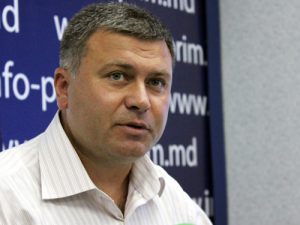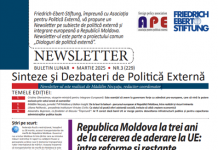The new European Neighborhood Policy presented officially by the European Commission contains new emphases as regards democracy. The European Union says stress will be laid on the democratic dimension as it will be hard to create a zone of stability, security and prosperity in the neighboring countries without stable democracy. But this new approach is in fact not new. It is a mainly a déjà vu and the European officials should be told this openly. The conclusions were formulated in a Press Club meeting of the Foreign Policy Association (APE).
By this new approach, the EU aims to establish closer partnerships with civil society which is considered to be playing an important role in promoting its reforms in the immediate vicinity. It also intends to strengthen its role in resolving frozen conflicts in its neighborhood. The EU assured it will also strengthen the Eastern Partnership, both on the bilateral and multilateral dimensions.
The EU promised to use a much higher differentiation principle and to strengthen the principle of conditionality. The new proposal is based on a ‘more funds for more reform approach. All these elements give a new impetus to the European Neighbourhood Policy, but also contain shortcomings. Unfortunately, the new policy did not arouse enthusiasm in the countries covered by the Eastern Partnership,” said the APE executive director Victor Chirila.
The new policy contains such new phrases as ‘development of deep and sustainable democracy and ‘support for the development of inclusive economy. Even if the terms are innovative, the content is the same, said Victor Chirila. The new policy also envisions the creation of two new instruments for financing projects and programs initiated by nongovernmental organizations to promote reforms. According to Victor Chirila, both of the funds are extremely necessary, but it is not clear how they can be accessed and if the rigid practices that consume much time and effort will be preserved.
The European Union intends to improve participation in the resolution of the Transnistrian conflict through instruments provided by the EUs Common Foreign and Security Policy. But for Moldova these offers are not new. They have been used since 2005. Regretfully, the new approach does not offer certitude that the realities will change significantly in this respect,” said Victor Chirila.
The new approach is also designed to strengthen the Eastern Partnership. There will be negotiated and implemented the Association Agreements and the Agreements on the Creation of Deep and Comprehensive
Free Trade Areas. However, Victor Chirila said that these objectives were stated back in May 2009. Moldova expected that the renewed ENP will clearer shape the chances of achieving the given objectives, even if not in the near future.
According to Victor Chirila, the weak point is the lack of a long-term view that would motivate not only the political elites, but also societies in the member counties of the Eastern Partnerships to actively engage in the reform process that would bring Moldova closer and integrate it into the EU.
On May 25 this year, the European Commission launched a ‘new and ambitious European Neighborhood Policy. The proposal sets out the main priorities and directions of a revitalized ENP strategy, which seeks to strengthen individual and regional relationships between the EU and countries in its neighborhood through a ‘more funds for more reform approach și making more additional funds available, but with more mutual accountability.
The Press Club meetings are organized by the Foreign Policy Association in partnership with the German foundation Friedrich Ebert Stiftung.







